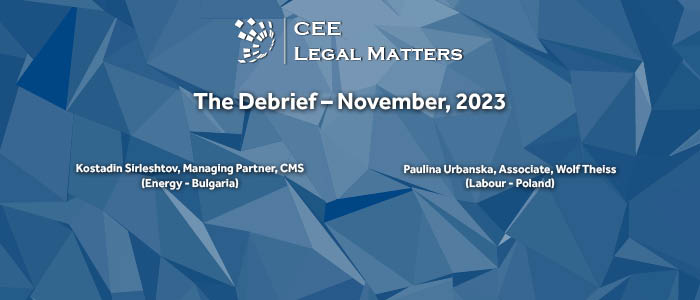In The Debrief, our Practice Leaders across CEE share updates on recent and upcoming legislation, consider the impact of recent court decisions, showcase landmark projects, and keep our readers apprised of the latest developments impacting their respective practice areas.
This House – Implemented Legislation
The Bulgarian energy sector, according to CMS Sofia Managing Partner Kostadin Sirleshtov, continues its dynamic development, with changes to the Bulgarian energy legislation having been enacted on October 13, 2023. “They aim to introduce more predictability on the grid connection procedure of renewable energy power plants,” Sirleshtov notes.
“Producers are obliged to pay a guarantee in the form of a deposit or bank guarantee in the amount of BGN 50,000 per megawatt of projected installed capacity to secure its grid connection,” Sirleshtov continues. “Thus, the legislator aims to terminate all speculative renewable energy projects which in practice block grid connection capacity without being developed and implemented.” In addition, he says, “Bulgaria puts forward a substantial administrative relief since the easement rights for the construction or re-powering of renewable projects shall be granted by the power of law. The wind projects shall benefit from these changes since developers are no longer required to secure easement rights by virtue of individual agreements with owners of the affected land plots.”
“Furthermore, Bulgaria introduced a so-called ‘energy contribution’ for the import and transit of Russian natural gas in the amount of BGN 20 per megawatt hour, with LNG explicitly left outside the scope of that energy contribution,” Sirleshtov adds.
As for Poland’s implemented legislation, Wolf Theiss Associate Paulina Urbanska highlights that “October 7, 2023, was the deadline for introducing remote work,” as specified in the December 1, 2022 amendment to the Labor Code. “By that date, employers had to revise rules and regulations on the use of telework and institute new guidelines for remote work,” she says.
According to Urbanska, “Although telework and remote work might seem similar, they have very distinct features.” For instance, she says, while both are performed remotely, telework can be performed simply outside the workplace, whereas remote work can be done wholly or partially at a location designated by the employee and agreed with the employer in each case. “It’s critical to note that telework was not automatically replaced by remote work by law,” she notes. “Not adapting internal regulations to the amendment can have dual consequences,” Urbanska adds. “Failure to introduce remote work regulations while simultaneously prohibiting the use of existing telework regulations could result in dissatisfaction or even prompt employees previously engaged in the form of telework to terminate their employment contracts.” In addition, she says, “during an inspection, the State Labor Inspectorate may point out inconsistencies of internal regulations with the Labor Code,” and “in cases of flagrant violations, the employer may even face a financial penalty.”
The Verdict
Sirleshtov highlights that while recently implemented energy legislation “introduced a simplified procedure for the construction of agrivoltaics in agricultural land without a change of land designation,” still, regarding the agrivoltaic projects, there is uncertainty since “the President of Bulgaria requested before the Constitutional Court to declare as unconstitutional the development of these projects.”
Done Deal
Sirleshtov also highlights the recent M&A transaction on the renewables market in Bulgaria: “Turkiye’s largest construction company ENKA acquired a 40-megawatt photovoltaic project worth EUR 8.4 million,” adding that the Bulgarian energy market continues to be vibrant.






















